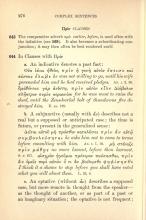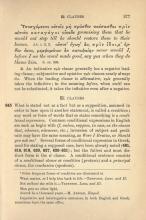643. The comparative adverb πρίν (earlier, before) is used often with the infinitive (see § 568). It also becomes a subordinating conjunction; it may then often be best rendered until.
644. In Clauses with πρίν
a. An indicative denotes a past fact.
Oὐκ ἰέναι ἤθελε, πρὶν ἡ γυνὴ αὐτὸν ἔπεισε καὶ πίστεις ἔλαβε.
He was not willing to go, until his wife persuaded him and he had received pledges.
Xen. Anabasis 1.2.26
δμᾱθέντας γὰρ ἀνῑ́στη, πρὶν αὐτὸν εἷλε Δῑόβολον πλῆκτρον πυρὸς κεραυνίου.
For he was wont to raise the dead, until the Zeus-hurled bolt of thunderous fire destroyed him.
Eur. Alcestis 128
b. A subjunctive (usually with ἄν) describes not a real but a supposed or anticipated case; the time is future, or present in the generalized sense.
Δεῖται αὐτοῦ μὴ πρόσθεν καταλῦσαι πρὶν ἄν αὐτῷ συμβουλεύσηται.
He asks him not to come to terms before consulting with him.
Xen. Anabasis 1.1.10
μὴ στέναζε πρὶν μάθῃς.
No more lament, before thou learnest.
Soph. Philoctetes 917
αἰσχρὸν ἡγοῦμαι πρότερον παύσασθαι, πρὶν ἂν μεῖς περὶ αὐτῶν ὅ τι ἂν βούλησθε ψηφίσησθε.
I think it a shame to stop before you shall have voted what you will about them
Lysias 22.4
c. An optative (without ἄν) describes a supposed case, but more remote in thought from the speaker—as the thought of another, or as part of a past or an imaginary situation; the optative is not frequent.
Ὑποσχόμενος αὐτοῖς μὴ πρόσθεν παύσασθαι πρὶν αὐτοὺς καταγάγοι οἴκαδε
promising them that he would not stop till he should restore them to their homes
Xen. Anabasis 1.2.2
οὔποτʼ ἔγωγʼ ἂν, πρὶν ἴδοιμʼ ὀρθὸν ἔπος, μεμφομένων ἂν καταφαίην.
Never would I, before I see the word made good, say yea when they do blame him.
Soph. Oedipus the King 505
d. An indicative πρίν clause generally has a negative leading clause; subjunctive and optative πρίν clauses nearly always do. When the leading clause is affirmative, πρίν generally takes the infinitive; in the meaning before, when until can not be substituted, it takes the infinitive even after a negative.


